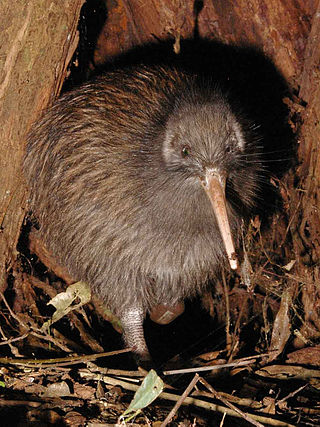
Kiwi are flightless birds endemic to New Zealand of the order Apterygiformes. The five extant species fall into the family Apterygidae and genus Apteryx. Approximately the size of a domestic chicken, kiwi are the smallest ratites.

Achillea millefolium, commonly known as yarrow or common yarrow, is a flowering plant in the family Asteraceae. Growing to 1 metre tall, it is characterized by small whitish flowers, a tall stem of fernlike leaves, and a pungent odor.

Hydrangea, commonly named the hortensia, is a genus of more than 70 species of flowering plants native to Asia and the Americas. By far the greatest species diversity is in eastern Asia, notably China, Korea, and Japan. Most are shrubs 1–3 m tall, but some are small trees, and others lianas reaching up to 30 m (100 ft) by climbing up trees. They can be either deciduous or evergreen, though the widely cultivated temperate species are all deciduous.

Sir David Frederick Attenborough is a British broadcaster, biologist, natural historian and author. He is best known for writing and presenting, in conjunction with the BBC Natural History Unit, the nine natural history documentary series forming the Life collection, a comprehensive survey of animal and plant life on Earth.

The Sun Bowl is a college football bowl game that has been played since 1935 in the southwestern United States at El Paso, Texas. Along with the Sugar Bowl and Orange Bowl, it is the second-oldest bowl game in the country, behind the Rose Bowl. Usually held near the end of December, games are played at the Sun Bowl stadium on the campus of the University of Texas at El Paso. Since 2011, it has featured teams from the Atlantic Coast Conference (ACC) and the Pac-12 Conference.

Narew National Park is a National Park in Podlaskie Voivodeship, north-eastern Poland, created in 1996. Prior to that, its area was part of the Narew Landscape Park.
The Animal Diversity Web (ADW) is a non-profit online database site that collects natural history, classification, species characteristics, conservation biology, and distribution information on species of animals. The website includes photographs, sound clips, and a virtual museum.

The wattle-necked softshell turtle, also commonly known as Steindachner's soft-shelled turtle, is an endangered Asian species of softshell turtle in the family Trionychidae. The species is the only member of the genus Palea.

Pelochelys is a genus of very large softshell turtles in the family Trionychidae. They are found from peninsular India northeast to southern China, and south to Southeast Asia and New Guinea.

Symphyotrichum lateriflorum is a species of flowering plant in the aster family (Asteraceae). Commonly known as calico aster, starved aster, and white woodland aster, it is native to eastern and central North America. It is a perennial and herbaceous plant that may reach heights up to 120 centimeters and widths up to 30 centimeters.

An omnivore is an animal that has the ability to eat and survive on both plant and animal matter. Obtaining energy and nutrients from plant and animal matter, omnivores digest carbohydrates, protein, fat, and fiber, and metabolize the nutrients and energy of the sources absorbed. Often, they have the ability to incorporate food sources such as algae, fungi, and bacteria into their diet.
Phellinidium is a genus of fungi in the family Hymenochaetaceae. The genus, circumscribed in 1984, contains three species found in Europe.

iNaturalist is an American 501(c)(3) nonprofit social network of naturalists, citizen scientists, and biologists built on the concept of mapping and sharing observations of biodiversity across the globe. iNaturalist may be accessed via its website or from its mobile applications. iNaturalist includes an automated species identification tool, and users further assist each other in identifying organisms from photographs. As of 17 June 2023, iNaturalist users had contributed approximately 161,278,660 observations of plants, animals, fungi, and other organisms worldwide, and around 350,000 users were active in the previous 30 days.
Skeletocutis brevispora is a species of poroid crust fungus in the family Polyporaceae. It was described as new to science in 1998 by Finnish mycologist Tuomo Niemelä.

Givans Creek Woods is a 10.73-acre (4.34 ha) wooded area near Co-op City in The Bronx, New York City.

Lycorma imperialis is a planthopper indigenous to parts of China and Indo-Malaysia. L. imperialis was originally discovered in 1846 by Adam White and has one recognized non-nominate subspecies, L. i. punicea. L. imperialis has undergone a number of reclassifications since its discovery and is one of four species in the genus Lycorma. L. imperialis follows a hemimetabolous life cycle and will undergo a series of nymphal stages (instars) before maturing to an adult.













